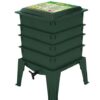Maybe you want to try something different, something unique to your area, or just something to gross out your neighbors! Worm farming is educational, beneficial to nature, and has a lot of potential in the market if you know how to push your product.
An earthworm can lay 900 eggs a year. That’s a lot of eggs. They can produce CO2. That’s a positive thing. Their digestive system helps neutralize acidic soil or soil with a high alkaline level. That’s a gardener’s friend. Worms are a source of food for other animals. A natural food that is safe and healthy. So, how can you go wrong with a good worm farm?!
An interesting and strange thing to know about worm farming is that many years ago Cleopatra declared earthworms to be sacred, gods of fertility. A little old earthworm was protected and cherished, death to the person who caused harm to the earthworm.
America is not so kind to the lowly earthworm. Usually it is forgotten, ignored, or used for bait or gardening purposes. Some other cultures use it for food, which could be considered sacred to a starving person!
A healthy thing you need to know about worm farming is that if you want to lower your cholesterol level, go eat worms. Seriously, earthworms can reduce your cholesterol level because they contain Omega 3 oil. You are probably saying that you’d rather have a high cholesterol level. But what else are you putting in your system on a daily basis? To a vegetarian, meat eaters are the sick people. To the meat eater, only eating vegetables can seem crazy. So, who’s to say eating worms is wrong, especially considering the health benefits. They’re good protein, less fattening, cheap to produce and cost a lot less than steak! If you prefer a sophisticated term for this oddity, its scientific term is entomophagy.
Worm farming is usually done for reasons other than eating, of course. Those worms in the bait shop or in the pet store have to come from somewhere. Now you know where they came from. Worm farms do have their risks, of course, as does any business. Making money with them is not necessarily easy. You have to know your worms, know your market, and know how to manage your money.
Feeding your worms doesn’t cost much for a small worm farm. They eat dirt, decayed leaves, animal manure, living organisms found in the soil, vegetables and fruits, non-glossy paper products, grains, grass clippings, and wood pieces. Just make sure that whatever you feed them has no residues of any type of poisons.
You can start a worm farm in a simple container with some dirt, holes for air and drainage, moisture, and food scraps. Large containers will need some sort of sifting tray for when you are ready to harvest your worm crop. You may want to capture the drainage to use for tea for your plants. Once you see how the process works on a small scale, you can decide whether or not it’s something you would want to become further involved with as a substantial business.
Find another of my posts on this topic: How to Compost with Worms – Use a Worm Bin!
Related Posts
Can You Profit From Hydroponics?


5 (8) Did you hear the story of a farmer who started growing strawberries? Yes? But, do you know he…
Conventional vs. Organic Hydroponic Nutrients


0 (0) Are “Organic” nutrients really better for your system or for your customers? Find out in this video from…


